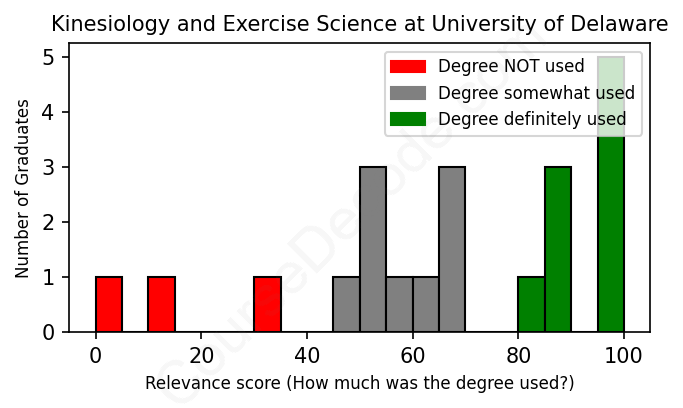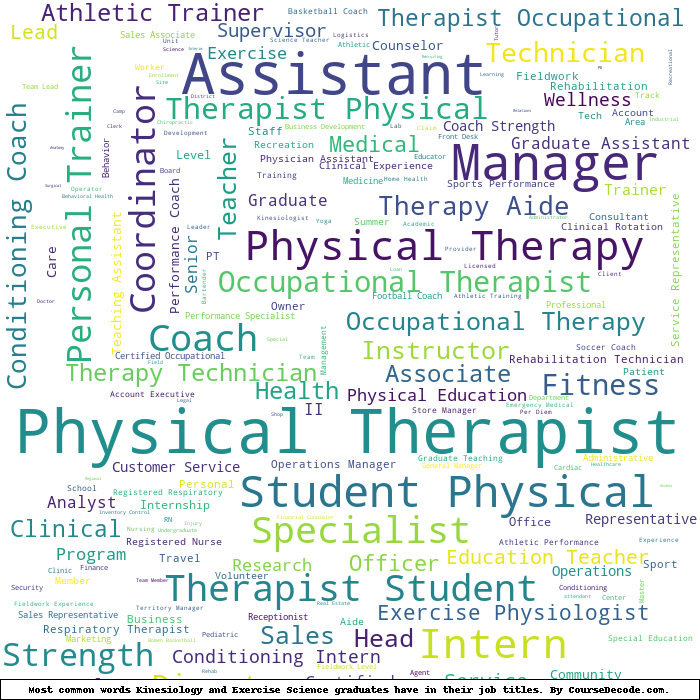
First, some facts. Of the Kinesiology and Exercise Science graduates from University of Delaware we've analyzed , here's how many have used (or NOT used) their degree in their career:

These are estimates based on AI analysis of 21 LinkedIn profiles (see below).
The verdict? Slightly below average. Overall, with an average relevance score of 66%, Kinesiology and Exercise Science graduates from University of Delaware have a slightly lower likelihood (-1%) of finding work in this field compared to the average graduate across all fields:
And for comparison, here's the chart for all profiles we've looked at across all degrees.
Also, after graduating, 85% of these graduates have pursued further education other than another Bachelor's degree (such as a Masters degree or other), compared to the average across all profiles of 35%. This suggests you may need more than just a Bachelors degree to be competitive as a Kinesiology and Exercise Science graduate.
See the details:
|
Relevance score: 61% We think this person has gone into a career only somewhat relevant to their degree. We think this person has gone into a career only somewhat relevant to their degree.
DEGREE INFOGraduated in 2020 from University of Delaware with a Bachelor's of Science in Kinesiology and Exercise Science. Also pursued further education since (see below). JOB HISTORY SINCE GRADUATIONSoccer Coach Soccer Shots Franchising Aug 2020 - May 2021 Sales Associate  Orangetheory Fitness Oct 2020 - May 2021 Student Physical Therapist  Massachusetts General Hospital Mar 2022 - Apr 2022 Student Physical Therapist  Spaulding Rehabilitation Network Jul 2022 - Aug 2022 Student Physical Therapist  Professional Physical Therapy May 2023 - Aug 2023 FURTHER DEGREES DONE SINCE GRADUATINGDoctorateBoston University 2021 - 2024 ABOUTDoctor of Physical Therapy student at Boston University and recent college graduate from the University of Delaware with a major in Exercise Science and a Strength and Conditioning minor. |
The top 10 most common jobs done by the graduates we've analyzed (ranked most common to least) are:
Many graduates from the Kinesiology and Exercise Science program at the University of Delaware tend to land jobs in physical therapy, sports performance, and rehabilitation roles. A significant number of them become physical therapists or physical therapy aides, where they effectively use the knowledge of human movement and rehabilitation principles they've gained from their studies. These positions are highly relevant to their degree, allowing them to apply what they learned in school directly to their day-to-day tasks, especially if they are involved in patient care and therapeutic practices.
However, not all roles connected to Kinesiology and Exercise Science maintain this level of relevance. Some graduates end up in administrative positions, like being an administrative assistant or in roles within healthcare operations that don't require specific knowledge from their studies. Others explore coaching or fitness-related positions that might dabble in kinesiology concepts but don't delve deeply into the core principles they studied. Overall, while many graduates find jobs that strongly relate to their degree, there are cases where the link is more tenuous, showing a diverse range of career pathways emerging from this field of study.
Here is a visual representation of the most common words in job titles for Kinesiology and Exercise Science graduates (this is across all Kinesiology and Exercise Science graduates we've analyzed, not just those who went to University of Delaware):

So, if you're looking at what graduates from the University of Delaware with a degree in Kinesiology and Exercise Science end up doing, it looks like many of them steer towards various roles in the healthcare and fitness industries right after graduation. A lot of them land first jobs as physical therapy aides, technicians, or internships related to physical therapy or sports performance. This makes sense since these positions are closely aligned with their studies and give them valuable hands-on experience that’s crucial for their next steps. As they gain experience, many graduates transition into more advanced roles, such as becoming licensed physical therapists, occupational therapists, or sports coaches, often within five years of graduating.
Fast-forward about ten years, and it seems like many are still in relevant healthcare roles, specializing further in physical or occupational therapy, or even exploring academic and research positions in related fields. However, there are also a few who’ve veered off the expected path into roles that don’t relate directly to kinesiology or exercise science. Some have taken jobs in logistics, operations, or administrative roles, which might reflect a shift in personal interests or career opportunities that diverge from what they initially trained for. Overall, while there’s a solid path for a lot of graduates in health and rehabilitation sectors, a few have ended up in different industries, showing that a kinesiology degree can open various doors depending on what individuals choose to pursue.
Honestly, a Bachelor’s degree in Kinesiology and Exercise Science can be a bit of a mixed bag when it comes to difficulty. At the University of Delaware, or really any school, you're gonna encounter some tough classes, especially when it comes to the sciences like anatomy and physiology, but if you’re passionate about sports, fitness, or health, it can feel pretty rewarding. There are definitely easier majors out there, but if you put in the work and don’t mind crunching some numbers or diving into the biology of the human body, you’ll likely find it manageable. Just keep up with the coursework, and you’ll do just fine!
Most commonly, in the LinkedIn profiles we've looked at, it takes people 4 years to finish a Bachelor degree in Kinesiology and Exercise Science.
Looking at these Kinesiology and Exercise Science grads from the University of Delaware, it seems like they've mostly landed on a decent financial footing, especially as many are in the healthcare field where salaries aren’t too shabby. For instance, physical therapists and occupational therapists can earn good salaries, usually in the range of $70k to over $90k annually once they get some experience under their belts. Some grads have taken more varied paths, like working in research or even logistics management, which can fluctuate in terms of pay. But overall, it looks like most of these folks are on a solid career track, moving into roles that typically offer good pay and stability as they gain experience. While not all of them have skyrocketed to high salaries right out of the gate, their career trajectories suggest they’re likely doing pretty well for themselves in the long run!
Here is a visual representation of the most common words seen in the "about" section of LinkedIn profiles who have a Bachelor degree in Kinesiology and Exercise Science (this is across all Kinesiology and Exercise Science graduates we've analyzed, not just those who went to University of Delaware). This may or may not be useful:

Here are all colleges offering a Bachelor degree in Kinesiology and Exercise Science (ordered by the average relevance score of their Kinesiology and Exercise Science graduates, best to worst) where we have analyzed at least 10 of their graduates: